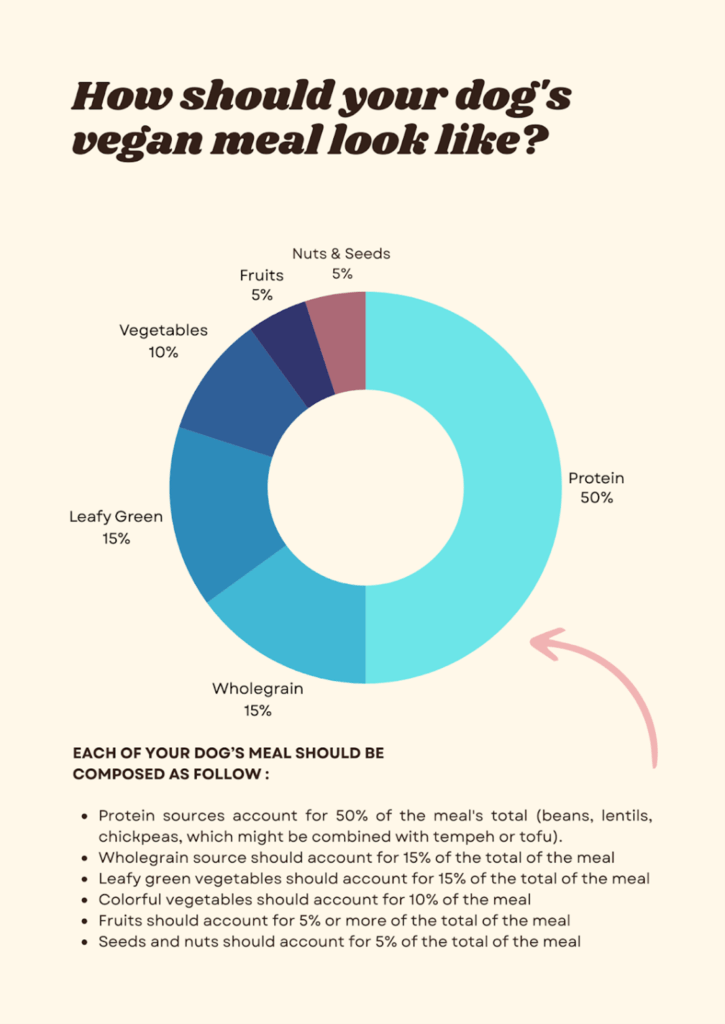Fruits are a staple of our diets, providing us with highly bioavailable vitamins and minerals that are crucial to our health. But what about our dogs? Are fruits even healthy for them? If so, what kinds of fruits are suitable for your dogs, and how should they be administered safely?

Should Your Dog Consume Fruits?
The straightforward answer is yes; your dog can, and should, eat fruits on a regular basis, ideally raw. According to the graphic below, which has been approved by veterinary nutritionists and canine nutritionists, fruits should account for 5% of the total weight of each of your dog’s meals, excluding snacks.

Which Fruits Are Safe for Your Dog?
- Acai Berries: These little dark-colored berries are one of the most antioxidant-rich foods on earth, with cardioprotective, gastroprotective, hepatoprotective, neuroprotective, renoprotective, antilipidemic, antidiabetic, and antineoplastic properties for your dog.
- Apple: Apple is a wonderful superfood for your dog, especially if it is locally farmed and organic. One of the most significant advantages of apples for dogs is their anti-cancer properties. Numerous studies have found that extracts from apple peel display effective antiproliferative activity against breast cancer, liver cancer, and prostate cancer cells.
- Apricot: These delicate fruits are especially good for your dog’s eyes and vision because they contain high levels of highly bioavailable retinol and beta carotene, which reduce the risk of age-related macular degeneration, a condition that can lead to blindness in dogs.
- Avocado: Avocado is frequently misrepresented as dangerous to canines, but it is actually a superfood for your dog with several health benefits. The main advantage of avocados is their potential to reduce cardiovascular disease (CVD), the most common type of heart disease in dogs, by 16%. Want to learn more about dogs and avocado? We wrote about it on this blog!
- Banana: These yellow fruits, which dogs usually adore, are particularly rich in potassium, despite being so easily accessible and underappreciated. According to scientific research, potassium reduces the risk of heart disease by 27%.
- Blueberries: Highly appreciated by dogs, these small berries, especially the wild ones, provide an outstanding number of health benefits for your dog, including lowering the risk of diabetes, cardiovascular disease, and improving cognitive function.
- Blackberries: The manganese in blackberries plays a key role in your dog’s body by helping to form new connective tissue, control blood clotting, build strong bones, and maintain hormonal balance.
- Blackcurrants: Blackcurrants’ immunomodulatory, antibacterial, and anti-inflammatory properties, together with their ability to lower cardiovascular disease risk, make them a wonderful occasional addition to your dog’s diet.
- Coconut: This fruit may be consumed by your dog in a variety of forms, including coconut water (which is more hydrating than conventional water owing to its mineral content), coconut milk, and coconut meat to boost its general health.
- Cranberries: These tiny little red berries have outstanding properties for reducing urinary tract infections, improving your dog’s immune function, preventing some forms of cancer, and lowering blood pressure.
- Cherries: These delectable fruits, which are great for reducing inflammation and oxidative stress in the canine body, are a fantastic and healthy snack for your dog or part of their regular meals.
- Clementine: Full of healthy fibers that are essential for your dog, clementines have been shown to have antitumor properties. The high level of antioxidants in these orange fruits helps keep more of the body’s cells healthy and less susceptible to becoming cancerous.
- Dragon Fruit: This exotic fruit has been used as medicine since ancient times, and it dramatically reduces the indicators of risk factors for many canine diseases, as well as excessive cholesterol, which is common in dogs. Dragon fruits have also shown anticancer effects.
- Fig: An excellent fruit for maintaining your dog’s heart health by decreasing blood pressure and increasing healthy cholesterol inside the body, while also being high in essential minerals, vitamins, fibers, and amino acids.
- Kiwi: Evidence has revealed that kiwi consumption raises vitamin C levels within the body and improves the functions of immune system cells called neutrophils. Neutrophils are white blood cells that help protect against pathogens and infection.
- Lychee: This small fruit, which is particularly rich in vitamin C, may help protect your dog’s heart, skin, coat, and brain, as well as maintain a healthy immune system.
- Mango: Aside from being very tasty and liked by most dogs, mangoes are abundant in a variety of essential nutrients, including vitamin K, which is necessary for your dog’s blood coagulation and bone health and helps prevent anemia.
- Melon: Excellent for your dog’s digestion, this sweet fruit boosts your dog’s immune system, providing deep hydration and an anti-inflammatory effect.
- Orange: Regular intake of oranges will help keep your dog’s cholesterol levels low, knowing that healthy cholesterol levels reduce your dog’s risk of developing diabetes and heart diseases.
- Papaya: Evidence suggests that this exotic fruit helps with liver disease in dogs by reducing oxidative stress, inflammation, and lipogenic gene expression. This fruit also aids in wound healing and reduces oxidative stress, which is the source of many canine illnesses, including cancer.
- Plum: Regular plum consumption has a protective effect on your dog’s heart by decreasing cholesterol and blood pressure, helping prevent lung and oral cancers, and inhibiting the development of infectious diseases.
- Peach: According to studies, peaches help lessen allergy symptoms by reducing the release of histamines into the bloodstream, and the antioxidants found in peaches are recognized for their anticancer properties.
- Pomegranate: Pomegranate juice has strong antioxidant capabilities, and researchers at the University of California discovered that it appears to inhibit the growth of cancerous cells.
- Pineapple: The bromelain contained in this sweet fruit, which has been used in traditional medicine for centuries, has been shown to reduce inflammatory markers in the digestive tissues in dogs, and this group of digestive enzymes is particularly helpful for dogs with pancreatitis. The healthy fibers contained in pineapple are a great help for digestion.
- Pear: Pears have been shown in studies to protect against ulcers, which are unfortunately common in dogs, as well as lower plasma lipids and help with weight loss in overweight dogs. According to the Association for Pet Obesity Prevention, over 59% of dogs are overweight or obese.
- Persimmon: This vibrantly colored fruit is particularly high in beta-carotene, which has been associated with a decreased incidence of heart disease, lung cancer, colorectal cancer, and metabolic illnesses. Regular intake may also protect your dog from diabetes.
- Raspberries: Research has reported that red raspberry extract killed up to 90% of colon, breast, and stomach cancer cells, while another found that sanguiin H-6, an antioxidant contained in raspberries, caused cell death in more than 40% of ovarian cancer cells. These red berries also include one of the highest levels of good dietary fiber of any plant food.
- Strawberries: Regular consumption of these tasty berries has been shown to reduce cognitive decline in dogs while minimizing inflammatory diseases.
- Tangerine: Tangerines are a real antioxidant powerhouse, which includes naringin, naringenin, nobiletin, narirutin, and hesperidin, which may help protect your dog against chronic brain problems and neurodegenerative diseases.
- Tomato: Tomatoes in your dog’s diet have been linked to a lower incidence of prostate cancer, and they are high in nutrients that are essential for their health. Tomatoes must be fed to your dog when ripe, as unripe tomatoes are poisonous to dogs.
- Watermelon: Lycopene, a phytochemical, reduces the risk of cancer in dogs by reducing blood levels of insulin-like growth factor (IGF), a hormone that drives cell proliferation. To put it briefly, cancer develops when cell division becomes uncontrollable.
Are Some Fruits Toxic to Your Dog?
There are very few fruits that are toxic to dogs, so if your dog eats one by accident, please call your veterinarian as soon as possible. Grapes and raisins are the only fruits demonstrated by evidence to be harmful to dogs. However, research has not been able to determine why and how grapes and raisins are harmful to dogs, and the incidence of acute renal failure and death following grape intake is low in dogs.
How Can You Safely Offer Fruits to Your Dog?
- Pits: Remove any pits from fruits such as avocado, cherries, plums, peaches, lychee, mango, and apricot.
- Seeds: Remove the seeds from cantaloupe, canary melon, pear, papaya, honeydew melon, and apples. The seeds of watermelon do not need to be removed.
- Peels: Hard-textured peels must be removed before feeding to your dog. This includes watermelon, all sorts of melons, avocado, papaya, kiwi, pineapple, coconut, orange, clementine, pomelo, tangerines, banana, dragon fruit, mango, lychee, and pomegranate. The peels of peaches, tomatoes, apricots, pear, apple, fig, plum, and cherry can be left on.
- Fruits that can be given whole, with no parts removed: Strawberries, blueberries, raspberries, blackberries, cranberries, acai berries, and black currants (black, red, and white).
- Stems and Leaves: Always remove the stems and leaves from any fruits before giving them to your dog.
- Cutting: Fruits should always be served in bite-sized portions to prevent choking, particularly in smaller dogs.
How Should Fruits Be Incorporated into Your Dog’s Diet?
You may add fruits to your dog’s diet whether you feed them commercial dog food or cook their meals yourself. Fruits may be sprinkled on top (5% of the total meal amount), or they can be served as a healthy snack between meals. The simplest method to include fruits in your dog’s diet is to sprinkle them on top of the other ingredients, or you may blend them into the rest of your dog’s meal.

Claire Lucie Sonck
The science of plant-based nutrition for dogs
Certified, CMA-registered canine nutritionist;
Founder The Vegan Dog Coach;
Instagram : @thevegandogcoach
Contact : [email protected]
About the author
Claire Lucie is a UK-certified canine nutrition coach, founder of The Vegan Dog Coach, and a member of the prestigious Complementary Medical Association. Her mission is to improve the health and longevity of 100 million dogs worldwide by promoting a plant-based diet, based on the latest insights in nutrition and canine health. Over the past two years, she has dedicated her life to studying more than 250 scientific studies on the impact of nutrition on the health and longevity of dogs!
Visit www.thevegandogcoach.com for free resources, consultation, and professional guidance in plant-based canine nutrition, inspiring testimony from plant-based dogs and vets, free recipes, and all the science behind your dog’s plant-based diet and nutrition.
Disclaimer
This material is intended for educational purposes only. No information in this present article, regardless of date, should ever be used as a substitute for direct veterinary advice from your veterinarian or other qualified canine health professional.
The vegan dog coach, Claire Lucie Sonck, VegaVriend, and their respective employees or collaborators cannot be held liable for any losses, injuries, or damages resulting from the use of any information contained in the present article.
